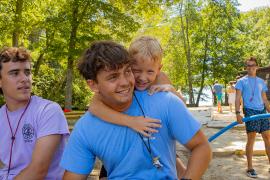Annually, the ACA Hotline Team provides an analysis of the kinds of hotline calls we fielded and lessons learned for camp professionals to use for staff training. Additionally, we share the most common resources we use to assist callers.
Because so many camps were unable to run during summer 2020, we had a much smaller volume of crisis hotline calls. Most of our calls were related to operational questions and clarifications related to the coronavirus pandemic.
COVID-19-Related Calls
Many of our COVID-19-related calls were due to lack of familiarity with the Environmental Health & Engineering (EH&E) Field Guide for Camps. Here are the most commonly overlooked considerations when planning for mitigation and interventions due to pandemic issues:
- What are your guidelines for transporting campers by van? By bus? What if a child arrives by train or plane — is quarantine required?
- What is your plan to provide for safe physical distancing to allow campers and staff a break from their masks — especially when it is extremely hot and humid outside?
- What will you do if you discover you have an asymptomatic camper who has a COVID-19 positive sibling (who did not come to camp)?
- Are your camper screening procedures adequate to protect your campers and staff?
- Are your healthcare staff trained and equipped to keep all campers and staff safe as the summer progresses, especially if/when you have an individual test positive for the virus?
- Are your staff trained to protect the identities of individuals who may test positive from other campers, staff, and parents?
The American Camp Association partnered with the YMCA of the USA to evaluate and clarify the health standards to which a camp would have to adhere to operate this summer. We collaboratively hired an environmental health consulting firm, EH&E, who established a panel of independent experts to provide a practical, science-based camp operations guidebook for the COVID-19 environment. The EH&E Field Guide for Camps provides updated educational resources to support camps in their decision-making process.
COVID-19 Resources:
- ACA’s COVID-19 Resource Center for Camps
- EH&E Field Guide for Camps
- CDC Camp Planning Tool
- Association of Camp Nursing COVID-19 Considerations for Camps
Historic Incidents at Camp
We also had several calls regarding historic child abuse and serious staff-to-staff misconduct that happened at camp. Social attitudes toward past abuse and the legal environment in the US is changing, and camp professionals need to be aware. Twenty-four states passed statute of limitations reform bills in 2019, and more have been introduced. “We need to develop cultures and environments at camp where any inappropriate behavior, red flags, or rule breaking — both by campers and staff — is immediately detected and addressed before it can develop into abuse” (Trapani, 2019). Camps should consult with their own legal and insurance professionals to make sure they are well-prepared should they receive a call related to historic abuse.
Many of those who called with historic abuse-related concerns had never considered, planned for, or asked themselves questions such as:
- Do you have multiple layers of protection in place to safeguard against abuse?
- Do you have your staff sign a code of conduct?
- Do you train your staff annually on how to recognize, prevent, and report abuse? Do your staff understand their role as mandatory reporter?
- Is your board prepared to respond to historic allegations of abuse?
- Would you know how to respond to a victim of past abuse at your camp?
Historic Abuse Resources:
- National Overview of Statutes of Limitation (SOLs) for Child Sex Abuse, ChildUSA
- Sexual Abuse Prevention: Responding to 2019 Legislative Changes, Redwoods Group
- Preparing for Historical Accusations of Abuse: A Board-Level Drill, Redwoods Group
Reference
- Trapani, K. (Fall 2019). Everything has changed: abuse prevention at camp in the age of #metoo. The CampLine, XXXI(2), 12–15.


